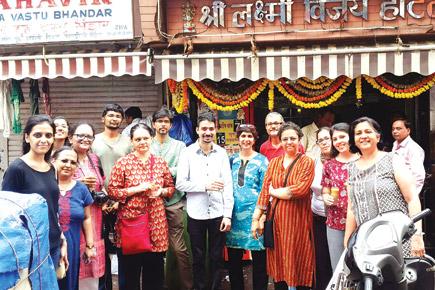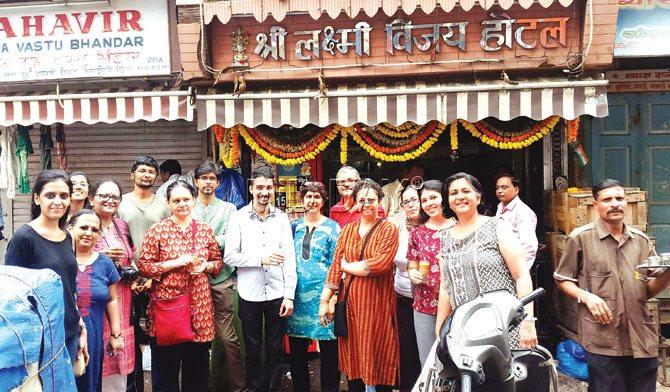I had no clue that the city of Bombay (as it was called then) was built on the back of the American Civil War

Architect Kaiwan Mehta pauses for chai during his Bhuleshwar guided walk. Pic/Sarayu Kamat
 I had no clue that the city of Bombay (as it was called then) was built on the back of the American Civil War. Last Sunday, I stumbled upon this fundamental fact of Bombay, during a most invigorating guided walkabout in Bhuleshwar by Kaiwan Mehta, architecture theorist and author of Alice in Bhuleshwar: Navigating a Mumbai Neighbour-hood (Yoda Press). He was guiding his students from Jnanapravaha, and I had joined as an alumnus. Mehta pointed out that the American Civil War of the 1860s disrupted its cotton trade, and Bombay, which had a good harbour, was quick to pick up on the crisis and launch itself.
I had no clue that the city of Bombay (as it was called then) was built on the back of the American Civil War. Last Sunday, I stumbled upon this fundamental fact of Bombay, during a most invigorating guided walkabout in Bhuleshwar by Kaiwan Mehta, architecture theorist and author of Alice in Bhuleshwar: Navigating a Mumbai Neighbour-hood (Yoda Press). He was guiding his students from Jnanapravaha, and I had joined as an alumnus. Mehta pointed out that the American Civil War of the 1860s disrupted its cotton trade, and Bombay, which had a good harbour, was quick to pick up on the crisis and launch itself.

Architect Kaiwan Mehta pauses for chai during his Bhuleshwar guided walk. Pic/Sarayu Kamat
ADVERTISEMENT
We learnt about the origins of Bhuleshwar in the 19th and early 20th century: the name comes from Bhola Eshwar, but Mehta calls him the Lord of Forgetting, as in forgetfulness in a labyrinth. Starting the walk at Golden Star Thali near Charni Road station, we went along Raja Rammohan Roy Road and Jagannath Shankar Sheth Road, ending at the Cotton Exchange. Bhuleshwar is a bustling quarter with Hindu, Christian and Jain communities; its dense, narrow lanes teem with people, houses, temples, churches, markets, shops and go-shalas.
Mehta spoke eloquently and knowledgeably about "reading architecture as a novel", of its many stories and the narratives connecting a house or street to deeper economic, socio-political, literary and musical movements. Bombay, he observed, was largely built on migrant wealth and migrant labour — in other words, by outsiders. The city was funded by agricultural taxes from the United Provinces and elsewhere, migrant merchants, including Premchand Roychand from Surat, and migrant labour from Gujarat and other states — all overseen by English planning.
Parrot squawks filled the morning air as Mehta described how Bhuleshwar used to be a hub for nationalism, Gandhiji's Dandi March and social reform — girls' school buses were once stoned. Gated communities here, such as Bhatia Wadi for Saurashtra merchants, were based on ethnicity, not economic status, as they are today.
"In fact, the verandah became a joint living room, as the wadi and chawl reshaped the family life of migrant youth and families," Mehta explained. "You could wander about in a nightie, and not be worried if neighbours knew what you were cooking or heard your fights, because they were your extended joint family."
We walked into Khotachiwadi, the Christian enclave. Its bungalows have Venetian elements — balconies and stained glass — and James Ferreira's bungalow, with beautiful woodwork, had an operatic aria floating down from its windows. Later, we visited Krishna Baug, Hira Baug and Madhav Baug at CP Tank. Madhav Baug is a vast complex including a temple, wedding hall, library and go-shala.
Much of this area has already been replaced by skyscrapers, so hurry while it's still there. Bhuleshwar is a microcosm of the larger city, and we should guard the city's rich, multi-cultural, multi-lingual, cosmopolitan history. Even if Bhuleshwar is the Lord of Forgetting, we must rage against the dying of memory. As we lingered over a hot 'Manpasand chai', and Mumbai remembered Bombay, my heart was singing.
Meenakshi Shedde is South Asia Consultant to the Berlin Film Festival, award-winning critic, curator to festivals worldwide and journalist. Reach her at meenakshishedde@gmail.com
 Subscribe today by clicking the link and stay updated with the latest news!" Click here!
Subscribe today by clicking the link and stay updated with the latest news!" Click here!







